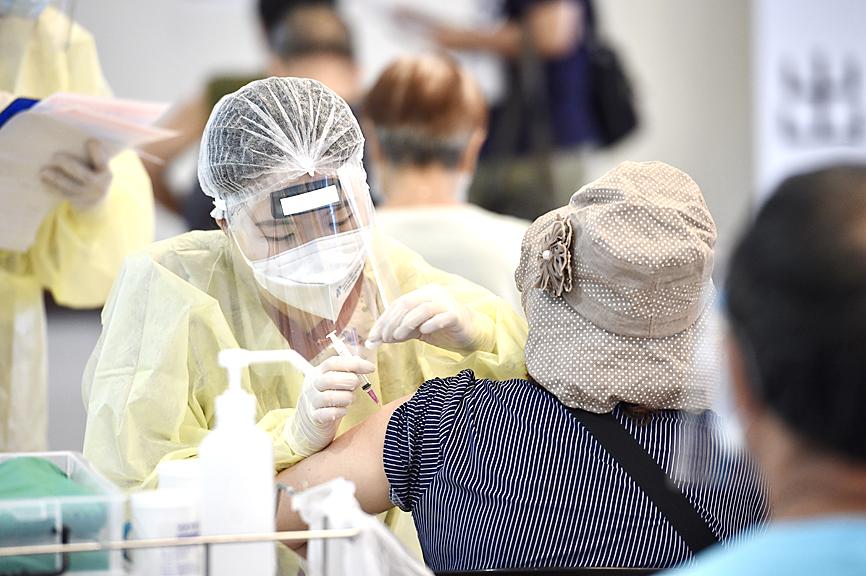Taiwan People’s Party Legislator Lai Hsiang-ling (賴香伶) yesterday urged the government to relax COVID-19 restrictions for the supplementary education and after-school care sectors, and to vaccinate workers in those industries before schools reopen in September.
Starting today, the Central Epidemic Command Center is to ease some COVID-19 restrictions on a conditional basis, although the nation remains under a level 3 COVID-19 alert through July 26.
At an online news conference, Lai said many supplementary education facilities are asking why gyms and movie theaters are being allowed to reopen, while they were not included in plans to ease restrictions.

Photo: Peter Lo, Taipei Times
Lo Ching-wei (羅靖為), a working parent in Hsinchu, said that since schools moved to online learning in May, his two children, who are enrolled in grades five and eight, have spent long periods of time on electronic devices.
Such extended use of electronic devices is harmful for their concentration and eyes, he said.
Amid high temperatures, families are also struggling with the cost of electricity, specifically for air-conditioning, he said.
As family members spend more time at home, there has also been friction among them, he said.
Lin Shuo-yan (林碩彥), another working parent in Hsinchu, said it was contradictory for the government to relax restrictions for some businesses, but not for kindergartens and other educational facilities.
“As parents, we must place importance on children’s right to education,” he said.
The suspension of in-person classes, which has been imposed for more than a month, has affected students’ lifestyles and habits, he said, adding that parents are worried about how children can readjust to school.
After-school education facilities take students’ temperatures and disinfect their premises on a daily basis, After School Educational Association representative Hsieh Chih-fang (謝智芳) said.
They can implement disease prevention measures, including maintaining a distance of 1.5m between students and setting up dividers, he said.
Unlike night markets and other places for whom restrictions have been relaxed, after-school education facilities have fixed clients, he said.
The government has reopened businesses that should remain closed, and kept closed businesses that should be reopened, he added.
If the nationwide level 3 alert is lowered after July 27, there would be no reason to keep cram schools closed, he said.
He urged the government to finish vaccinating cram school teachers against COVID-19 before the end of this month so that they can resume classes.
Summertime is peak season for cram schools, he said, adding that many elementary and junior-high school students are sent to cram schools during summer break.
Workers at supplementary education and after-school care facilities should be vaccinated as soon as possible, as students would also be returning to those facilities if schools reopen in September, Lai said.

Taiwanese scientists have engineered plants that can capture about 50 percent more carbon dioxide and produce more than twice as many seeds as unmodified plants, a breakthrough they hope could one day help mitigate global warming and grow more food staples such as rice. If applied to major food crops, the new system could cut carbon emissions and raise yields “without additional equipment or labor costs,” Academia Sinica researcher and lead author the study Lu Kuan-jen (呂冠箴) said. Academia Sinica president James Liao (廖俊智) said that as humans emit 9.6 billion tonnes of carbon dioxide compared with the 220 billion tonnes absorbed

The Taipei Mass Rapid Transit (MRT) Wanda-Zhonghe Line is 81.7 percent complete, with public opening targeted for the end of 2027, New Taipei City Mayor Hou You-yi (侯友宜) said today. Surrounding roads are to be open to the public by the end of next year, Hou said during an inspection of construction progress. The 9.5km line, featuring nine underground stations and one depot, is expected to connect Chiang Kai-shek Memorial Hall Station to Chukuang Station in New Taipei City’s Jhonghe District (中和). All 18 tunnels for the line are complete, while the main structures of the stations and depot are mostly finished, he

Taipei is to implement widespread road closures around Taipei 101 on Friday to make way for large crowds during the Double Ten National Day celebration, the Taipei Department of Transportation said. A four-minute fireworks display is to be launched from the skyscraper, along with a performance by 500 drones flying in formation above the nearby Nanshan A21 site, starting at 10pm. Vehicle restrictions would occur in phases, they said. From 5pm to 9pm, inner lanes of Songshou Road between Taipei City Hall and Taipei 101 are to be closed, with only the outer lanes remaining open. Between 9pm and 9:40pm, the section is

China’s plan to deploy a new hypersonic ballistic missile at a Chinese People’s Liberation Army Rocket Force (PLARF) base near Taiwan likely targets US airbases and ships in the western Pacific, but it would also present new threats to Taiwan, defense experts said. The New York Times — citing a US Department of Defense report from last year on China’s military power — on Monday reported in an article titled “The missiles threatening Taiwan” that China has stockpiled 3,500 missiles, 1.5 times more than four years earlier. Although it is unclear how many of those missiles were targeting Taiwan, the newspaper reported